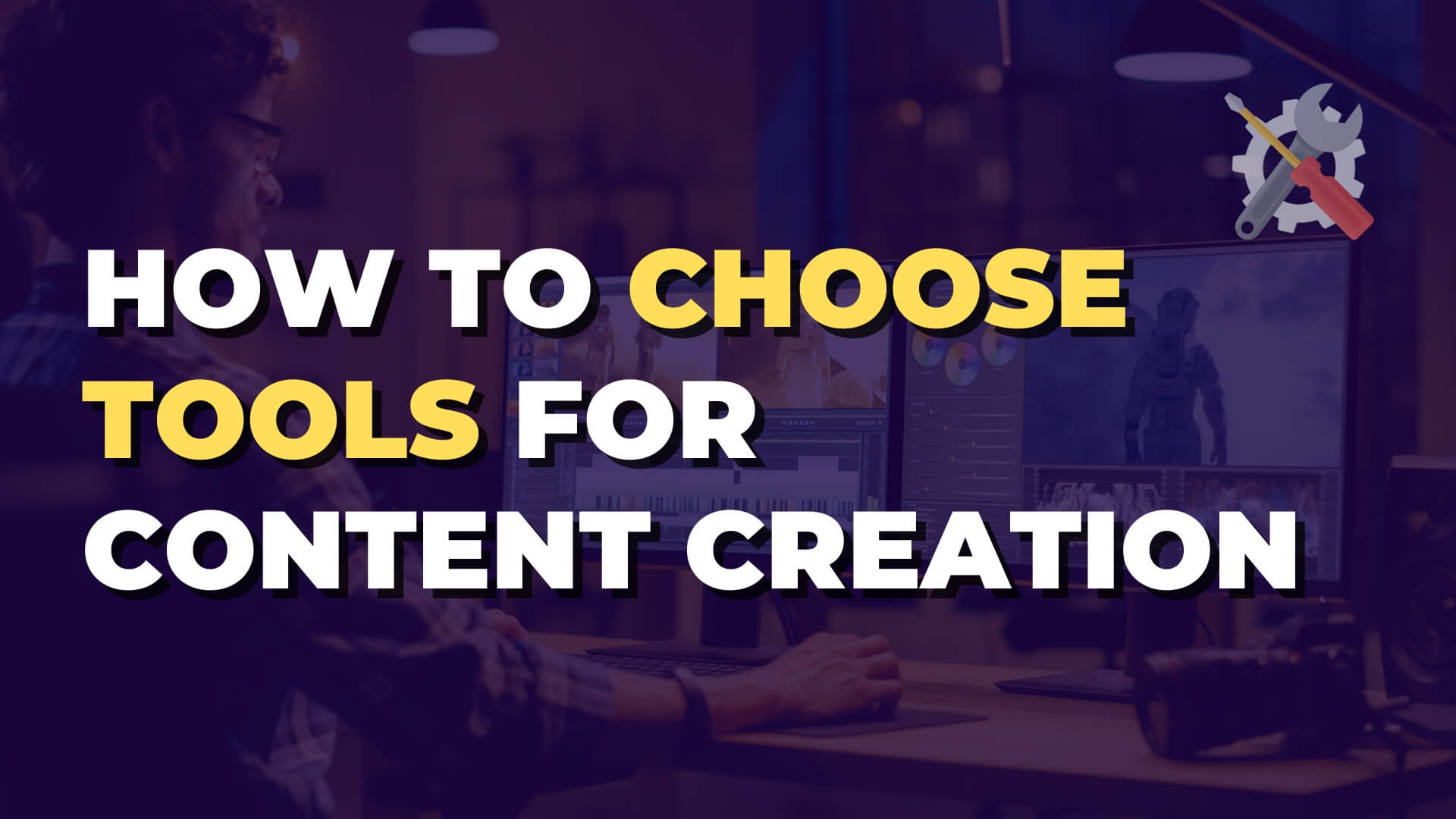How to choose tools for content creation
Previously, I covered the types of equipment you need for a minimalist home studio.
This week, I’m covering the next critical element: recording and editing software.
Every week in the groups I’m part of and when we onboard new clients into our content engine service, the question of how to record comes up.
Recording software is the critical link between your home studio or recording setup and your final content.
To help answer this question, I steer people toward a simple decision-making process that I’ve used both for hundred-million-dollar technology decisions down to ten-dollar apps.
- Think about and write down your requirements – what are the must-have and nice-to-have features you need (remember that simplicity, ease of use, etc., can be important features)
- Research and create a short list of products/solutions
- Review the feature lists and specs, and for each, in a simple spreadsheet, check off all the must-have and nice-to-haves that each choice provides
- Choose the top 3 from your list that cover the most features
- Sign up for trial accounts and use each candidate. Make your final choice and use it.
Recording software requirements
The first step is figuring out and writing down your requirements.
Start with what you plan to record now and in the near future.
Here are some ideas:
- Recording yourself, face to camera
- Recording yourself, moving or on the go
- Recording interviews with one or more guests in person
- Recording interviews with one or more guests remotely
Then, think about how you plan to create your content:
- Will it be pre-recorded?
- Will you stream your content online?
- Will you live stream your content? To one or multiple destinations?
Next, think about your recording setup:
- Will you have more than one camera and microphone?
- Will you be presenting material like slides?
- Will you be mixing in pre-recorded videos or other media?
Beyond that, there are other requirements that often make sense to include, like:
- Must support Mac, PC or both
- Local, high-resolution recording of your content
- Automatic cloud recording of your content
- Ability to record at least 1080P (HD) or 4K resolution
There could be a lot more, but these are the essentials to consider, and right down the ones that apply to your specific goals.
Research and create a short list of candidates
With your requirements written down in a simple spreadsheet, now it’s time to find potential solutions.
A simple Google search like “best recording and editing software in 2023” will usually return review and round-up posts, which can be very helpful.
Asking in Facebook groups what other people use can also be helpful (but DON’T use that as the basis of your choice as their requirements are likely different than yours)
The main idea is to ensure we have at least the top 5 – 10 choices captured in our list.
Assess the candidate’s features
Recording software and services always have a features and spec list page.
This is what you want to look at and compare to your requirements list.
For each of your requirements, check to see if the candidate software claims to meet them and checkmark each that it does.
Do this for the top 5 candidates at least.
Choose the top 3
From your list, choose the top 3 that cover most of your requirements. If none of them meet all of your major requirements, then you need to look for more candidates.
Knowing this space as I do, there will be several good choices in almost all cases.
With your top 3 candidates selected, it’s time to test-drive them.
Evaluate and make your decision
This step takes a bit of time but helps you make a very solid decision: create trial accounts and actually use the software to see if it meets your requirements.
It may take some time to learn as recording and editing software can be complicated, but since this is one of the most critical pieces of your tech stack, it’s worth it.
What I use and why
Note: Links below are may be affiliate links.
After going through the above process, I landed on two solutions.
For recording, since I currently use a Mac Studio and Macbook Pro, and answered yes to almost all the potential requirements above, I use Ecamm.
Ecamm is the most full-featured of all the solutions for Mac. For PC, a similar high-end solution is vMix.
Ecamm lets me record locally at high resolution and stream anywhere. It also lets me mix and match any type of content (slides, pre-recorded, etc.)
It can also handle remote guests and interview recordings as well as stream into Zoom.
For editing, I use Descript, which lets you edit video just like a Word document.
For the basics, it is much simpler than any other editing tool out there.
What should you use?
It depends on YOUR requirements, which is the point of this issue, BUT since people still want simple answers, here’s my general recommendations based on the most common requirements:
- If you need an advanced setup, for Mac, use Ecamm; for PC, use vMIX or OBS.
- If you just need a simple setup and are NOT streaming, use Descript (which now includes Squadcast for remote guest recording). This works on Mac and PC.
- If you just need a simple setup and ARE streaming, then I recommend StreamYard for recording/streaming and Descript for editing.
Once you’ve made your choice, it’s worth watching tutorials and training to make sure you get the most out of it so that using it becomes second nature.
You want to remove all potential roadblocks from creating content.
Take Action
If you don’t already have an editing and recording solution in place, now is the time so you can create more revenue-generating content in 2024!
- Think about and write down your requirements
- Research and create a short list of products/solutions
- Review the feature lists and specs, and for each
- Choose the top 3 from your list
- Evaluate each candidate and make your final choice
I hope this helps you make the best decision for your content creation!

David Ziembicki
David Ziembicki is the founder and CEO of the Expert Business Agency, which helps coaches, course, and membership creators build their online businesses. David has been an industry-leading technology and business consultant for over 25 years having worked at Microsoft, Deloitte, SAIC, and Avanade.

